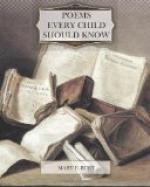The world is too much with
us; late and soon,
Getting and spending,
we lay waste our powers;
Little we see
in Nature that is ours.
We have given our hearts away,
a sordid boon!
This sea, that bares her bosom
to the moon,
The winds that
will be howling at all hours,
And are up-gathered
now like sleeping flowers—
For this, for everything,
we are out of tune;
It moves us not. Great
God! I’d rather be
A pagan, suckled
in a creed outworn,
So might I, standing on this
pleasant lea,
Have glimpses
that would make me less forlorn;
Have sight of Proteus, rising
from the sea,
Or hear old Triton
blow his wreathed horn.
WILLIAM WORDSWORTH.
ON HIS BLINDNESS.
“Sonnet on His Blindness” (by John Milton, 1608-74). This is the most stately and pathetic sonnet in existence. The soul enduring enforced idleness and loss of power without repining. Inactivity made to serve a higher end.
“All service ranks
the same with God!
There is no first or last.”
When I consider how my light is
spent
Ere half my days, in this dark world and wide,
And that one talent which is death to hide,
Lodg’d with me useless, though my soul more
bent
To serve therewith my Maker, and present
My true account, lest He, returning, chide;
Doth God exact day-labour, light denied?
I fondly ask: but Patience, to prevent
That murmur, soon replies, God doth not need
Either man’s work, or His own gifts; who
best
Bear His mild yoke, they serve Him best; His
state
Is kingly; thousands at His bidding speed,
And post o’er land and ocean without rest;
They also serve who only stand and wait.
JOHN MILTON.
SHE WAS A PHANTOM OF DELIGHT.
“She Was a Phantom of Delight” (by William Wordsworth, 1770-1850) is included here because it is a picture of woman as she should be, not made dainty by finery, but by fine ideals—
“And not too good
For human nature’s daily food.”
She was a Phantom of delight
When first she gleamed upon my sight;
A lovely Apparition, sent
To be a moment’s ornament;
Her eyes as stars of Twilight fair;
Like Twilight’s, too, her dusky hair:
But all things else about her drawn
From May-time and the cheerful Dawn.
A dancing Shape, an Image gay,
To haunt, to startle, and waylay.
I saw her upon nearer view,
A Spirit, yet a Woman too!
Her household motions light
and free,
And steps of virgin liberty;
A countenance in which did
meet
Sweet records, promises as
sweet;
A Creature not too bright
or good
For human nature’s daily
food;
For transient sorrows, simple
wiles,
Praise, blame, love, kisses,
tears, and smiles.




